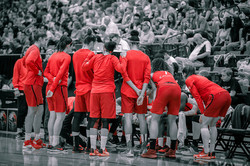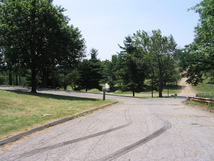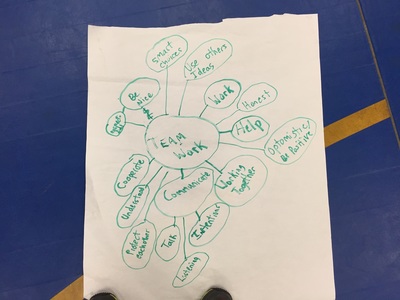| Elevated PE |
Elevating the level of PHysical education
 When we start our school years many #physed teachers start working on cooperation, teamwork, and communication. Often there is a group of favorite activities used because they are great cooperation game, but how are these activities customized for your classes needs? How are the character qualities your students value being addressed? Do your students really understand why they are doing these tasks? There was an excellent #physedsummit session on Unpacking #physed by Andy Hair and Andy Vasily. In that session one of the topics discussed is having students answer questions about main ideas for lessons to discover what they know and what they have discovered.This process was called unpacking, not to be confused with teachers unpacking standards. This questioning of students to find what lies beneath a question, a word, or a topic can help personalize learning and give the teacher a better view of what students know. This unpacking process can also find common themes and ideas students have regarding these topics. Reflecting on this I asked myself can you unpack Teamwork? Last year I did just that, my students unpacked Teamwork and this is what they unpacked from the idea of Teamwork After collecting this I needed to find a way to make it purposeful and have it help shape our learning. I knew I could do team building and cooperation better, but had to find my way I went through my usual activities looking for and discussing the things my students had listed with them in each activity. Even still I knew this was not enough while the cooperatives seemed student centered the learning that occurred was still structured for the same outcomes I have always looked for. This triggered a shift in my thinking to move more towards inquiry and also create an opportunity to build an experience to help students discover a concept connected to Teamwork. The focus of the lesson was communication, and positive versus negative comments within a group and then inquired how did these two types of communication affect their groups success, why did that happen. Starting this conversation got students thinking about how their words effected their success in a task and the groups ability to work together effectively. By making the experience focused on their experiences, ideas, and outcomes the students valued what they discovered. For years I told students to be nice, communicate positively, and to think about their words, but never allowed them to think about or discuss, why.
This year when my students Unpack Teamwork they will also be beginning to build their first unit. I am going to build experiences that help them discover the ideas that they have identified and why those are important. Each experience will also be used to inquire, what are we missing? Why is that important? Bringing inquiry into Team-building and cooperatives will add student perspective to a unit that often becomes a 'teacher's favorites" unit filled with fun cooperatives that hopefully build a class environment. Do you use inquiry in these types of lessons/units? If so how? What was your experience? How could incorporating inquiry be done better?
0 Comments
 I'm a child of the 80's and as such a huge fan of Back to the Future, I have often wondered would Marty have done any of the things he did knowing the crazy journey that awaited him. Much like Marty, last year I decided my students needed inquiry in their journey to Physical Literacy. If only everything was mapped out and handed to us it would all be so easy! Becoming an inquiry based teacher is not at all that way. Early on in the process of trying to better grasp how to teach with inquiry, I found more questions then answers. I wished for a map, a pre-created path I could simply follow and try to master. What I discovered was it isn't that simple. There is no path, there is no how to guide. Until you try to teach this way you cannot understand this fact. Inquiry based teaching is a choose your own adventure; you must be prepared for many different paths and outcomes to emerge. The hardest part is you do not choose what the character does, you're simply along for the ride. Much like Marty watching the consequences of his actions in the past, you have to watch the direction your lesson goes and how the Essential question steers your students. Each class will go a different way and the job of the teacher becomes keeping the lesson from going the wrong way or no where at all. As a teacher you have to be ready to solve a problem on the fly and adjust to the new direction of your lesson . Keeping your focus on the essential question keeps the lesson on track. Much like Marty, trying to prevent his family from the future from completely disappearing, you have to try to pull back your students from the edge of frustration and from a path far from where you are trying to help students get. So don't wait to grab the guitar and start rocking out for the sake of your students. You will miss some notes and overshoot with your metal skills but in the end you will come home with everything back to normal and possibly a little better then when you started the journey. Lastly find your Doc to help you along the way, mine came in the form of a few others; Naomi Hartl, Mel Hamada, Mark Williams, David Moore, and Andy Hair.  "We make our world significant by the courage of our questions and by the depth of our answers" Carl Sagan This quote covers the purpose of inquiry based learning, If the question has a purpose to every student, and their answers guide the path the class follows, it is far more significant then a Teacher driven class. Asking questions is an art form that takes practice. It is a skill to be honed and reflected upon. The question can make or break a TGFU lesson, and really is the starting point of the planning process. Reading about TGFU is easy writing good essential questions and crafting inquiry questions to help them answer the "big question" takes thought and practice. The success and failure of a TGFU class is in the questions. Good questions inspire thought and help drive change. Students can be guided or derailed by a question at the right or wrong time. As a still learning teacher of this style of teaching, this fact has pushed my thinking and planning to make sure to be prepared for which way my students may go in a lesson. Having questions ready to guide them back to the big idea of the day is vital. Some days, and even some classes I feel like a champ at this and sometimes I feel like a chump. Inquiry based teaching can be almost like a choose your own adventure book with classes constantly taking different paths to the answers they need. I am constantly reading up on, practicing, and asking others about their essential questions to get a better grasp myself. Crafting a question that is clear and helps students discover strategies is difficult and can be frustrating at times. Physedagogy to the rescue again with 3.0 having the masterful skills of Mel Hamada and Mark Williams guiding me into the art of asking essential question . Their session was key to bettering my process, and helping me realize how much time needs to be invested on questions. Paired with Andy Hairs session on unpacking ,and the content needed and the process to create a great essential question becomes much clearer. It is still a process and each class and even student can respond differently to the same question, but in the end the question is the answer. What they say in response shows what they have learned, and guides the next lesson and those after, I am now investing time properly when building questions. How do you approach this process? What has your Journey been like? What are your key resources?
|
AuthorSeth Martin has taught for over 10 years all in the Elementary PE setting. He has presented across CA and online for the Physedsummit 3.0. Passionate about doing what best for students and helping them become physically literate and love movement! Archives
August 2016
Categories |

 RSS Feed
RSS Feed
